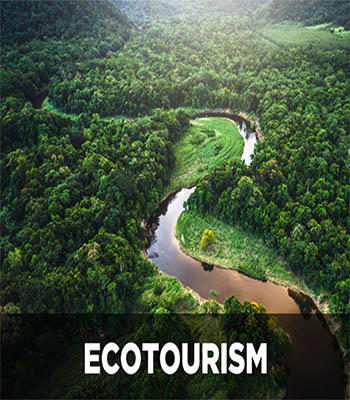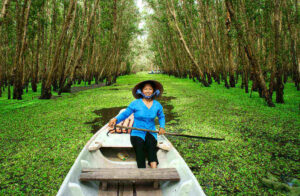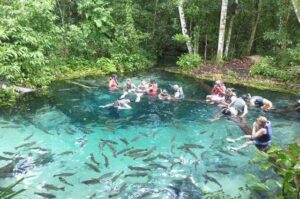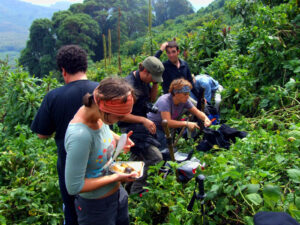
21世紀生態旅遊和生態旅館的發展
進入現代旅行和旅遊業一個世紀以來,地球上幾乎沒有哪個角落真正遠離人跡罕至的地方。

旅遊業是一個龐大的行業,估計每年產生3000億美元的收入,佔世界所有就業的近10%(Honey& Rome, 2000)。在全球化的背景下,這一數字預計只會增加,到2010年,全世界將有超過10億遊客在漫遊(TIES, 2000; WTO,2004)。對於環保主義者、發展專家和原住民族權益倡導者而言,這些預測都既是充滿希望,但同時也令人擔憂。
一百多年或更長時間的旅遊業表明,旅遊業可以而且經常確實地給當地人和自然環境留下可觀的包袱。歷史上,遊客引入的一些問題包括當地社區的擁擠和破壞、對文化傳統的商業利用、社會衝突、種族刻板印象的根深蒂固、對野生動植物的干擾、棲息地的退化或徹底轉變、經濟依賴性的增加、黑市的出現以及從外來寵物到毒品和性愛的一切非法貿易的增加(Greenwood, 1989; Eadington & Smith, 1992; Giannecchini, 1993; Lanfant et al., 1995; Butler and Hinch, 1996; Stonich, 1998;伯恩斯,1999;戴斯蒙德,1999年;錢伯斯,2000年)。簡而言之,無論是在人跡罕至的路上還是途中都有眾多的旅遊業經驗證明其帶有破壞性的,且無法永續經營。
A century into the age of modern travel and tourism, few corners of the planet remain truly off the beaten path. Tourism is a mammoth industry that generates an estimated US$300 billion in annual revenues and nearly 10% of all employment in the world (Honey and Rome, 2000). Under globalization, the numbers are expected only to rise, and by the year 2010,
more than one billion tourists will be roaming the world (TIES, 2000; WTO, 2004). For environmentalists, development specialists and indigenous rights advocates, the predictions are both promising and worrisome.
A hundred years or more of tourism have revealed that the industry can, and often does, leave considerable ‘baggage’ for the people and natural environments of local destinations. Some of the problems introduced historically by tourists include crowding and disruption of local communities, commercial exploitation of cultural traditions, social conflict, entrenchment of ethnic stereotypes, disturbance to wildlife, degradation or outright conversion of habitats, increased economic dependency, the emergence of black markets, and increased illicit trade in everything from exotic pets to drugs and sex (Greenwood, 1989; Eadington and Smith, 1992; Giannecchini, 1993; Lanfant et al ., 1995; Butler and Hinch, 1996; Stonich,
1998; Burns, 1999; Desmond, 1999; Chambers, 2000). In short, so many experiences with tourism, both on and off the beaten path, have proved disruptive, damaging and, in a word, unsustainable.

生態旅遊:更好的路徑?
如今的旅遊方式旨在消除行李,並為自然環境和當地人民帶來一系列好處。這些替代性遊覽,分別標有「永續」、「生態」和「負責任」,努力使旅遊業利潤為當地環境和社區服務,而不是反對他們。在這些新方法中,生態旅遊以其有望實現保護目標和改善當地人民的生計而脫穎而出。因此,生態旅遊被廣泛定義為基於自然的旅遊,具有三個特殊特徵:
(一)最大限度地減少了與大眾旅遊相關的負面環境、經濟和社會影響;
(二)為環境保護做出了積極的貢獻;
(三)改善當地人民的生活。換句話說,正是旅遊業試圖最大限度地減少負面影響,並為當今的許多環境和社會挑戰做出積極的積極貢獻。
從經濟角度來看,這種旅遊形式可能對東道國的人們真正有益。除了在國家一級增加外匯和投資外,生態旅遊還為當地勞動力提供了新的工作機會,並為當地生產的商品和服務提供了新的市場潛力。然而,與非經濟效益相比,生態旅遊的現金和就業收益實際上可能是適度的。後者可以包括恢復文化傳統和信仰、改善社區的組織和領導能力、增加對社區的自尊和自尊心、新的技能和語言,以及與擴大的人際網絡和潛在的支持來源聯繫,包括國際遊客和旅遊公司、私人基金會、大學和研究人員以及非政府組織(Stronza,2001; Landell-Mills和Porras,2002)。基於社區的生態旅遊在生態旅遊的保護和發展目標方面具有優勢。在以社區為基礎的生態旅遊中,當地社區或社區團體對生態旅遊的發展和管理有實質性的參與和控制,並且很大一部分收益仍然存在於社區中(Denman,2001)。在基於社區的方法中,將本地聲音、價值觀和知識主動地引入到資源管理策略中(Brosius等,1998)。許多支持者認為,這種參與是永續發展的基本要素,因為其在社區中產生了「主人翁感」和「賦權感」(Schevyens,1999; Alexander,2000; Stronza,2005)。

相反地,其他作者則認為旅遊目的地的當地人和遊客之間的權力不平等是潛在的環境問題根源(例如Stonich, 2000, Gossling, 2003)。當前的爭論不是當地社區是否應該參與其地區旅遊業的發展,而是如何參與其中。同時,環保主義者希望生態旅遊帶來的一系列社會和經濟利益將激勵當地居民保護遊客支付的景觀和資源。在這個
影響下,生態旅遊有時被視為最典型的「綜合4 A. Stronza保護與發展項目」(ICDP)。它具有以各種方式保存資源使經濟發展的潛力:首先,生態旅遊可以最大限度地減少或消除當地經濟對直接開發自然資源的活動的依賴,因此對生物多樣性的破壞更大,例如商業性農業、狩獵、伐木、養牛和金礦開採(Langholz, 1999; Jones and Young, 2004)。其次,生態旅遊會產生遊客費用以資助自然公園和保護區(Groom等,1991; Borges Hernándes等,第12章)。在生物多樣性豐富但收入不高的地方,這一點尤其值得注意。生態旅遊還可以幫助建立當地社區管理自然資源的管理和組織能力(Borman, 1999; Gordillo Jordan et al.)。

Ecotourism: A Better Path?
Today’s approaches to tourism are aimed at eliminating the baggage and introducing an array of benefits to natural environments and local peoples. These alternative tours, variously labelled ‘sustainable’, ‘eco’ and ‘responsible’, strive to make tourism profits work for local environments and communities rather than against them. Among these new approaches, ecotourism stands out for its promise both to advance conservation goals and improve the livelihoods of local peoples. Ecotourism is thus broadly defined as nature-based tourism with three special features: (i) it minimizes the negative environmental, economic and social impacts often associated with mass tourism; (ii) it delivers a net positive contribution to environmental conservation; and (iii) it improves the livelihoods of local people. In other words, it is tourism that attempts tominimize negative impacts and make instead serious positive contributions to a number of today’s environmental and social challenges. Economically, this form of tourism can be a real boon to people in host destinations. In addition to raising foreign exchange and investment on a national level, ecotourism offers the potential of new jobs for local labour and new markets for locally produced goods and services. The cash and employment benefit from ecotourism, however, may actually be modest compared with its non-economic benefits. The latter can include revalorization of cultural traditions and beliefs, improved community organization and leadership, increased self-esteem and pride in the community, new skills and languages, and contact with an expanded network of people and potential sources of support, including international tourists and tour companies, private foundations, universities and researchers, and non-governmental organizations (Stronza, 2001; Landell-Mills and Porras, 2002). Community-based ecotourism has an advantage with regard to ecotourism’s conservation and development goals. In community-based ecotourism, a local community or group of communities has substantial involvement in, and control over, ecotourism’s development and management, and a major proportion of the benefit remain within the community (Denman, 2001). In a community-based approach, local voices, values and knowledge are proactively channelled into strategies for managing resources (Brosius et al ., 1998). Many proponents argue that such participation is an essential element of sustainability, giving rise to a sense of ownership and empowerment in the community (Schevyens, 1999; Alexander, 2000; Stronza, 2005).
Conversely, other authors see unequalrelations of power among locals and visitors in tourism destinations as a potential source of environmental problems (e.g. Stonich, 2000; Gossling, 2003). The debate is currently not whether local communities should be involved in the development of tourism to their areas, but how they should be involved. Meanwhile, conservationists are hopeful that the array of social and economic benefits from ecotourism will generate incentives for local residents to protect the landscapes and resources tourists pay to see. In this light, ecotourism is sometimes viewed as the quintessential ‘integrated 4 A. Stronza conservation and development project’ (ICDP). It has the potential to make economic development work in the service of conservation in various ways. First, ecotourism can minimize or eliminate local economic dependence on activities that exploit natural resources directly and are therefore more damaging to biodiversity, such as commercial agriculture, hunting, logging, cattle ranching and gold mining (Langholz, 1999; Jones and Young, 2004). Second, ecotourism can generate visitor fees to help finance parks and protected areas (Groom et al., 1991; Borges Hernándes et al ., Chapter 12, this volume). This is especially noteworthy in places that are rich in biodiversity but poor in revenues. Ecotourism can also help build the managerial and organizational capacity of local communities to manage natural resources (Borman, 1999; Gordillo Jordan et al.)

是否真的會將我們帶到我們想去的地方?
由於其許多承諾,生態旅遊引起了極大的關注。大多數國際金融機構和發展機構已開始引導重要許多的經濟和技術為全球潛在的生態旅遊目的地提供幫助(Epler Wood,第14章,本冊)。為了建設當地的生態旅遊能力,人們付出了很多努力,以便社區可以開始為自己的發展目標開展旅遊工作。出於類似的樂觀態度,許多保護組織已經開始贊助世界各地生物多樣性「熱點」中的生態旅遊項目(Christ等,2004)。特別鼓勵熱帶國家對生態旅游進行投資,以作為增加急需的外匯並抑制環境惡化的一種可能解決方案。實際上,大多數具有保護區的國家現在都有某種形式的國家或地區營銷策略來吸引生態旅遊者(Ceballos-Lascurain,第13章,本冊)。生態旅遊的大膽議程也已成為重要研究和政策辯論的主題(Hawkins和Lamoureux,2001)。例如,在國際舞台上,聯合國宣布2002年為「國際生態旅遊年」,這標誌著它是總結經驗教訓的時候。在當年加拿大魁北克舉行的世界生態旅遊峰會上,來自132個不同國家的1000多名代表,分別代表公共、私人和非政府組織、學術機構、國家和國際發展機構以及地方和原住居民社區,進行了討論,聚焦在生態旅遊對全世界人民和生態系統的利弊。現在,正在計劃在全球範圍內討論認證和認可的計劃。同樣,在國家和地區層面也引起了很多關注:學術文獻蓬勃發展,講習班和培訓課程源源不斷,每天都在編寫有關生態旅遊的國家政策。美國和國外的許多大學現在提供生態旅遊的學位和課程。儘管樂觀,但對生態旅遊的評價很少。迄今為止,很少有生態旅遊項目以任何有系統、客觀的方式得到審核、認證甚至評估(Redford and Agrawal,2006)。幾乎沒有進行任何深度和長時間的研究(Kiss,2004),無數的運營機構和公司稱自己的產品為「生態旅遊」,即使他們可能不符合其定義(Honey, 2002; Kruger, 2005)。儘管生態旅遊很可能正在朝著其對於環境、社會和經濟方面的承諾邁進,但是仍然存在很大的差異,並且充滿令人懷疑的餘地。一些評論家認為,生態旅遊已經被牢牢地鎖在了「綠色資本主義」的概念中,因此對利潤的擔憂總是會超過對環境保護的擔憂(Duffy, 2002, p.x)。其他人觀察到,儘管言辭激烈,生態旅遊在文化上幾乎不敏感。

他們說,問題是生態旅遊仍然嵌入新自由主義的政治和經濟體系中,這排除了對當地習俗的真正尊重,以及對永續發展的真正機會或對當地的真正賦權社區(Mowforth and Munt, 1998; West and Carrier, 2004; Cater, 2006)。與此同時,其他持懷疑態度的人指出,甚至生態旅遊的商業領域也不足。有人說,生態旅遊只創造了幾個工作機會(Lindberg,1994),甚至在那時仍在增加當地對單一收入來源的依賴,迫使當地社區從更穩定、多元化的經濟中轉移過來(Belsky, 1999)。該行業容易出現「繁榮-蕭條」的周期和劇烈的季節性波動,這可能會造成脆弱性,特別是對自給生產者而言(Epler Wood,2002)。標榜「生態旅遊」的行動還與社會分化程度的提高以及貧富之間的差距日益擴大有關(Stonich,2000)。同時,利潤的剝削是一個持續存在的問題,儘管遊客經常為他們的生態探險付出高昂的價格,但一些旅行社卻不願將收益歸還給當地社區(Lindberg, 1991; Landell-Mills和Porras, 2002)。實際上,分析表明,只有相對少數的地方社區實現了顯著的收益,不管他們靠近旅遊業或保護區(Bookbinder等,1998)。「生態旅遊與保護之間的聯繫是微弱的」這一事實引起了進一步的懷疑。一些研究表明,在旅遊的住宿地中很少有人實際上從生態旅遊中獲得了足夠的經濟利益,可以提供足夠的保護動機(Kellert et al。,2000)。此外,在大多數保護區中,旅遊收入甚至無法彌補基本管理成本(Davenport等。,2002)
Will It Really Take Us Where We Want To Go?
For its many promises, ecotourism has captured considerable attention. Most international financial institutions and development agencies have begun channelling significant amounts of economic and technical assistance to potential ecotourism destinations around the world (Epler Wood, Chapter 14, this volume). Much effort has been aimed at building local capacity for ecotourism so that communities can begin making tourism work for their own development goals. With similar optimism, a number of conservation organizations have begun sponsoring ecotourism projects in biodiversity ‘hotspots’ around the world (Christ et al ., 2004). Tropical countries have been particularly encouraged to invest in ecotourism as a possible solution to raising much-needed foreign exchange while also curbing environmental degradation. In fact, most countries with protected areas now have some form of national or regional marketing strategy to attract ecotourists (Ceballos-Lascurain, Chapter 13, this volume). The Bold Agenda of Ecotourism has also become a subject of significant study and policy debate (Hawkins and Lamoureux, 2001). In the international arena, for example, the United Nations declared 2002 the ‘International Year of Ecotourism’, marking it as a time to take collective stock of lessons learned. At that year’s Ecotourism World Summit in Quebec, Canada, over a thousand delegates from 132 different countries, representing public, private and non-governmental organizations, academic institutions, national and international development agencies, as well as local and indigenous communities, gathered to discuss the pros and cons of ecotourism for peoples and ecosystems around the world. Now plans are taking shape for discussions of certification and accreditation on a global scale. Likewise, much attention is also being paid at national and regional levels. The scholarly literature is booming, a steady stream of workshops and training sessions is under way, and national policies on ecotourism are being written daily. A number of universities in the USA and abroad now offer courses and degree programmes in ecotourism. Despite the optimism, there have been few careful appraisals of ecotourism. Few ecotourism projects to date have been audited, accredited or even evaluated in any systematic, objective way (Redford and Agrawal, 2006). Few studies of any depth and duration have been undertaken (Kiss, 2004), and untold numbers of operations and companies are calling themselves ‘ecotourism’ even when they may not conform to its definition (Honey, 2002; Kruger, 2005). Though ecotourism may well be making strides towards its environmental, social and economic promise, there remains high variance and plenty of room for scepticism. Some critics argue that ecotourism is firmly ‘locked into notions of green capitalism’, so that concerns for profit will always outweigh those for conservation (Duffy, 2002, p.x). Others observe that, despite the rhetoric, ecotourism is hardly culturally sensitive.
The problem, they say, is that ecotourism remains embedded in a neoliberal political and economic system, which precludes real respect for local customs, real opportunities for sustainable development or real empowerment for local communities (Mowforth and Munt, 1998; West and Carrier, 2004; Cater, 2006).Meanwhile, other sceptics note that even the business side of ecotourism has come up short. By some accounts, ecotourism has created only a few jobs (Lindberg, 1994) and even then is increasing local dependency on a single income source, compelling local communities to shift away from more stable, diversified economies (Belsky, 1999). The industry is prone to boom–bust cycles and dramatic seasonal fluctuations, which can create gret vulnerability, especially for subsistence producers (Epler Wood, 2002). Operations labelled ‘ecotourism’ have also been associated with increased social differentiation and a growing gap between the rich and the poor (Stonich, 2000). At the same time, leakage of profits is a persistent problem, and though tourists often pay heftily for their eco-expeditions, some tour operators have been reluctant to pass on the returns to local communities (Lindberg, 1991; Landell-Mills and Porras, 2002). In fact, analysis indicates that relatively few local communities have realized significant benefits,regardless of their proximity to tourism operations or protected areas (Bookbinder et al., 1998). Further scepticism arises from the fact that the links between ecotourism and conservation are tenuous. Some studies have shown that few people in host destinations actually gain enough economic benefits from ecotourism to provide sufficient incentives for conservation (Kellert et al ., 2000). Furthermore, in the great majority of protected areas, tourism revenues are not able to cover even basic management costs (Davenport et al ., 2002)

文/ Amanda Stronza
圖/Website Resource
























